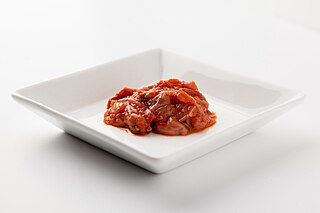
Kimchi, a staple food in Korean cuisine, is a traditional side dish of salted and fermented vegetables, such as napa cabbage and Korean radish, made with a widely varying selection of seasonings, including gochugaru, spring onions, garlic, ginger, and jeotgal, etc. It is also used in a variety of soups and stews. It is eaten as a side dish with almost every Korean meal.

Fermented fish is a traditional preservation of fish. Before refrigeration, canning and other modern preservation techniques became available, fermenting was an important preservation method. Fish rapidly spoils, or goes rotten, unless some method is applied to stop the bacteria that produce the spoilage. Fermentation is a method which attacks the ability of microbials to spoil fish. It does this by making the fish muscle more acidic; bacteria usually cease multiplying when the pH drops below 4.5.

Jeotgal (젓갈) or jeot (젓), translated as salted seafood, is a category of salted preserved dishes made with seafood such as shrimps, oysters, clams, fish, and roe. Depending on the ingredients, jeotgal can range from flabby, solid pieces to clear, broth-like liquid.
Jeotgalicoccus is a genus of Gram-positive, facultatively anaerobic, and halotolerant to halophilic bacteria. The cells are coccoid. The genus is named after the Korean fish sauce jeotgal, whence these bacteria were first isolated.
Alishewanella is a genus in the phylum Proteobacteria (bacteria).
Psychrobacter jeotgali is a species of bacteria named after jeotgal, a traditional Korean fermented seafood, where it was first isolated. It is a Gram-negative, non-motile, non-spore-forming, and moderately halophilic coccus. The type strain is YKJ-103T.
Psychrobacter is a genus of Gram-negative, osmotolerant, oxidase-positive, psychrophilic or psychrotolerant, aerobic bacteria which belong to the family Moraxellaceae and the class Gammaproteobacteria. The shape is typically cocci or coccobacilli. Some of those bacteria were isolated from humans and can cause humans infections such as endocarditis and peritonitis. This genus of bacteria is able to grow at temperatures between −10 and 42 °C. Rudi Rossau found through DNA-rRNA hybridization analysis that Psychrobacter belongs to the Moraxellaceae. The first species was described by Juni and Heym. Psychrobacter occur in wide range of moist, cold saline habitats, but they also occur in warm and slightly saline habitats.
Psychrobacter aquimaris is a Gram-negative, non-spore-forming, nonmotile bacterium of the genus Psychrobacter which was isolated from the South Sea in Korea.
Psychrobacter cibarius is a Gram-negative, nonmotile bacterium of the genus Psychrobacter, which was isolated from jeotgal in Korea.
Psychrobacter namhaensis is a Gram-negative, aerobic, non-spore-forming, slightly halophilic bacterium of the genus Psychrobacter, which was isolated from the South Sea in Korea.
Jeotgalicoccus halotolerans is a gram-positive bacterium. It is moderate halophilic, it growth in the presence of 0–20% NaCl. The cells are coccoid, with a diameter of 0,6–1,1 µm.
Jeotgalicoccus psychrophilus is a gram-positive bacterium. It is psychrophilic, it growth between 4 and 34 °C. To this also refers the selected species name. The cells are coccoid.
Jeotgalibacillus alimentarius is a bacterium, the type species of its genus. It was first isolated from jeotgal, hence its name. It is a moderately halophilic, round-endospore-forming bacterium, with type strain YKJ-13T.
Planomicrobium koreense is a bacterium, the type species of its genus. It was first isolated from jeotgal, a Korean dish, hence its name. Its type strain is JG07T.
Salinicoccus jeotgali is a bacterium, first isolated from jeotgal, hence its name. It is moderately halophilic, Gram-positive and coccus-shaped, designated strain S2R53-5T.
Halomonas alimentaria is a bacterium first isolated from jeotgal, a traditional Korean fermented seafood, hence its name. It is Gram-negative, moderately halophilic, non-motile and coccus- or short rod-shaped, with type strain YKJ-16T.

Methylobacterium jeotgali is a Gram-negative, strictly aerobic, motile and rod-shaped bacteria from the genus of Methylobacterium which has been isolated from fermented seafood jeotgal in Korea.

Baechu-kimchi (배추김치), translated as cabbage kimchi or simply kimchi is a quintessential banchan in Korean cuisine, made with salted, seasoned, and fermented napa cabbages.

Ojingeo-jeot (오징어젓) or salted squid is a jeotgal made by salting and fermenting thinly sliced squid. It is a popular banchan with high protein, vitamin and mineral contents.
Alishewanella jeotgali is a Gram-negative and facultative anaerobic bacterium from the genus of Alishewanella which has been isolated from gajami sikhae (jeotgal) from Korea.





